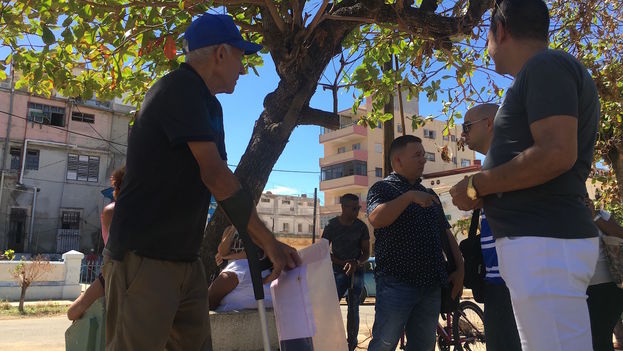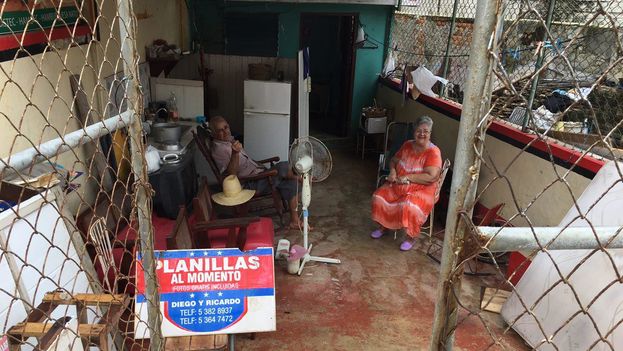
![]() 14ymedio, Zunilda Mata, Havana, 3 October 2017 — Communicating by phone with the US embassy in Havana has become an impossible task. From all parts of the island thousands of people are trying to find out what will happen to the consular interviews they had scheduled before the indefinite suspension of the issuing of visas by the embassy in Havana.
14ymedio, Zunilda Mata, Havana, 3 October 2017 — Communicating by phone with the US embassy in Havana has become an impossible task. From all parts of the island thousands of people are trying to find out what will happen to the consular interviews they had scheduled before the indefinite suspension of the issuing of visas by the embassy in Havana.
María Encarnación, known as Caruca, sunk into hopelessness when her daughter called her to give her the news. “My blood pressure went up because I had my consular appointment scheduled for October and now no one knows how to give me an explanation,” this retired 67-year-old tells 14ymedio.
After several hours of attempts, Caruca managed to speak with an employee of the US consulate, which upset her state of mind still further. “All operations are canceled until further notice,” the voice warned on the other end of the phone line. “This could be solved in a week or it could take years, we do not know,” she was told.
The cancellation of consular activity returns the imposing building that houses the embassy to a condition similar to that before 1977, at which time an agreement between Fidel Castro and Jimmy Carter allowed it to function as a US Interests Section in Havana. Since then, tens of thousands of people have applied for visas at its windows.
During the 2016 fiscal year, the United States approved visa applications for 14,291 Cubans, who took trips related to family, business, exchange or cultural and sporting events, among other categories. A much lower figure than the 22,797 visas granted in the same period of 2015 and the 41,001 in 2014.
A spokeswoman for the State Department explains the drastic reduction as an effect of “the extension, from six months to five years of the validity of the B2 visa for Cuban nationals.” However, since last January, when Barack Obama eliminated the wet foot/dry foot policy – which allowed Cubans who arrived on US soil without or without a visa to stay – many feared visa restrictions were imminent.
“I almost fell over when I heard what they told me on the phone. So I decided to come to Havana because I’ve been thinking that something like this would happen,” explains Caruca. She borrowed money, rented a private car from Los Palacios, in Pinar del Rio, where she lives with her husband and her son who remains in Cuba, to get to the capital as soon as possible.
“I was outside the embassy at dawn to wait for someone to come out and show their face,” she said Monday, in the small park where visa applicants have congregated for years. The place, still showing the traces of the wreckage left by Hurricane Irma, is no longer an area where hope and advice are offered “to succeed in the interview.”
Now, those who wait have a distressed look, trembling voices and their mobiles ringing constantly with calls from Miami, New York or Houston. “What do you want me to do mi’ja, if it can’t be done it can’t be done,” a man who said he had traveled from Jatibonico, in Ciego de Avila, shouted into his cell phone.
“It says that we have to check the website of the embassy, that all the information will be there,” he says, his voice getting even louder. The sun burns and some of those waiting take shelter under the shade of the trees, others take off their shoes while sitting on the benches. “This is going to be a while so better get comfortable,” he says.
After eleven o’clock in the morning, a Cuban official leaves the US consulate and is surrounded by people anxious for news. “All the interviews are canceled,” she repeated emphatically. A man wants to explain that his case is urgent because his brother has been admitted to a Texas hospital and this is perhaps his last chance to say goodbye.
The cancellation of the interviews puts at risk the number of visas that the consular section is supposed deliver each year in the Island. According to the migratory agreements signed between both countries in 1994 and 1995, the US must stamp 20,000 annual immigrant visas for Cuban applicants.
“Don’t you guys listen?” the employee repeats. The phrase makes Caruca’s blood pressure shoot up, while the most equanimous of the group start to sweat and the voice of a woman breaks as she just tries to say, “No, it can’t be like this, there has to be a mistake.”
One woman, who has arrived from Havana’s Marianao municipality and had an interview scheduled for Monday afternoon, complains, “I want to know if they are going to give me back the money,” demanding repayment for the appointment fee paid by her family in the United States, but the official has no answers and again recommends to consult the web.

For the surrounding businesses the news has been a blow. “We have gone out of business overnight,” says Diosdado, who helps his wife and daughter fill out the complex visa application forms. “Normally it was non-stop here, one customer after another and now nobody is coming,” he protests as he gestures to his empty room.
Some families in the area also subsisted on renting rooms to visa applicants. Some of their customers continue to arrive as they come to find out the status of their visa applications, explains the owner of a house with two rooms for rent, but “soon no one will come.”
Others have taken advantage of the stampede of Americans leaving to upgrade their furniture, appliances and food supplies. US officials returning home have held ‘yard sales’ in their homes offering all kinds of goods, with news of the events spread by email between Cuban employees of the US embassy and their friends and acquaintances.
“I bought a drill and a refrigerator,” says an embassy maintenance worker who learned of one of the sales in a mansion of Miramar. “I also managed to buy some chairs for the dining room and a battery lamp for when I don’t have electricity.” Although everything was acquired at a good price, the man regrets that now he will be out of work.
“Working with the yumas was good because they are very respectful, they give away many things and also the conditions of work were excellent,” says the employee who preferred anonymity and who says that his work helped him to get a visa when he wanted to and spend some vacation time in Orlando, Florida.
Now, the building where he worked for more than a decade has slowly been vacated. “Before the announcement on Friday many officials had already gone and this week the stampede will be great,” he says. “The consulate is one of the areas with the greatest reduction in staff and very few want to stay until everything is clear.”
The Cuban government says it has nothing to do with the acoustic attacks suffered by 21 US diplomats. In the official media the issue has been handled as something of minor importance, although on the street people aren’t talking about anything else.
A coffee vendor approaches the park a few yards from the Embassy and offers his merchandise in small plastic cups. “For the moment I keep selling because a lot of people are coming to find out about their interviews, but I do not know how long this will last.” A few yards away, the Cuban policemen who guard the diplomatic headquarters seem more tense than normal.
“They are afraid that this area will fill up with people complaining and protesting,” says the coffee vendor. “There is nothing that annoys a Cuban more than a cancelled trip,” he says. “Cubans can pass on quiet needs, lose their home in a hurricane and remain silent, but when it comes to a visa, they shout,” he reflects.
A woman of 60 asks for two coffees. She grabs them and relates that she has travelled 14 hours from Manzanillo, in Granma province. She had an interview scheduled on Monday for a residence visa for reunification with her son. Her plans have been ruined and her son insists to her, on the phone, that she approach the Embassy. “They don’t let you, I can’t,” she answers in a sob.
Afternoon falls and some are ready to stay until they receive a response. The people in the park, once envied for being close to a trip abroad, are now a bundle of frustrations and fears.
